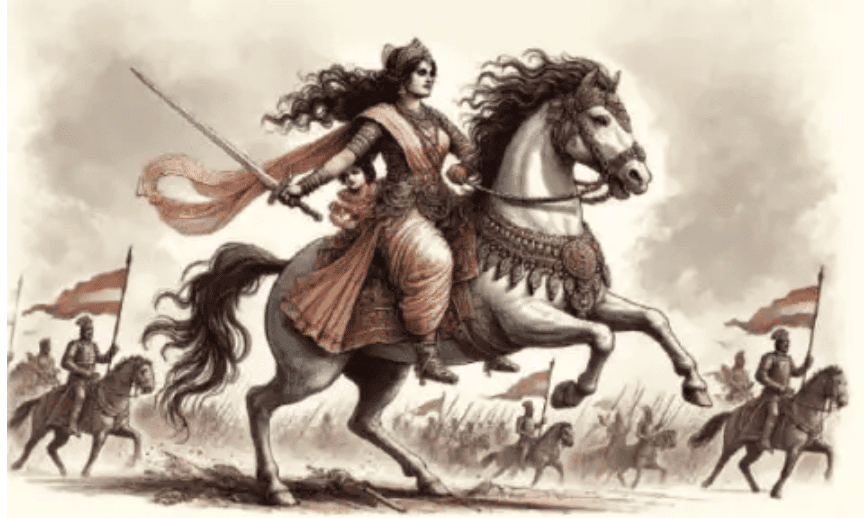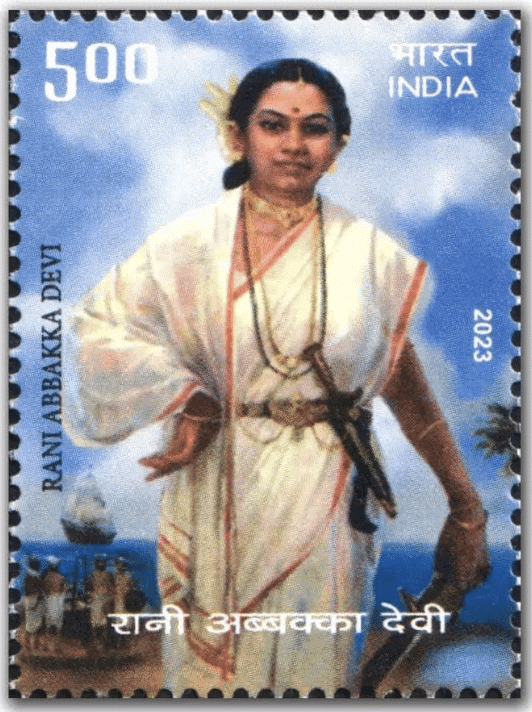Class 7 English Unit 5 Worksheet Solutions - Rani Abbakka
| Table of contents |

|
| Multiple Choice Questions (MCQs) |

|
| Fill in the Blank |

|
| True or False |

|
| Very Short Answer Questions |

|
| Long Answer Questions |

|
Multiple Choice Questions (MCQs)
Q1: Who was Rani Abbakka?
a) Queen of Kozhikode
b) Queen of Ullal
c) Queen of Bangadi
d) Portuguese envoy
Ans: b) Queen of Ullal
Rani Abbakka was the queen of Ullal, a small coastal kingdom in India, as stated in the story.
Q2: Why did the Portuguese demand tribute from Ullal?
a) To trade with Arabia
b) To maintain control over Ullal
c) To build merchant ships
d) To support local rajas
Ans: b) To maintain control over Ullal
The Portuguese demanded tribute to maintain control over Ullal, which they had captured, as mentioned in the story.
Q3: Who did Rani Abbakka form an alliance with?
a) Veera Narasimha
b) Portuguese army
c) Zamorin of Kozhikode
d) Local merchants
Ans: c) Zamorin of Kozhikode
Abbakka formed an alliance with the Zamorin of Kozhikode, a powerful coastal ruler, to strengthen Ullal.
Q4: How long did the battle for Ullal last?
a) Two days
b) Four days
c) One week
d) One month
Ans: b) Four days
The battle for Ullal lasted four days, after which the Portuguese were defeated and retreated.
Q5: What does the word “dauntless” mean in the story?
a) Fearless and brave
b) Angry and violent
c) Quick and rash
d) Weak and afraid
Ans: a) Fearless and brave
“Dauntless” is defined as fearless and brave, describing Abbakka’s spirit in fighting the Portuguese.

Fill in the Blank
Q1: Rani Abbakka was the queen of _______.
Ans: Ullal
Q2: The Portuguese attacked Ullal because Abbakka refused to pay _______.
Ans: tribute
Q3: Abbakka formed an alliance with the Zamorin of _______.
Ans: Kozhikode
Q4: The people of Ullal were inspired by Abbakka’s _______ and leadership.
Ans: courage
Q5: The word “sovereign” means free and _______.
Ans: independent
True or False
Q1: Rani Abbakka agreed to pay tribute to the Portuguese.
Ans: False
Abbakka refused to pay tribute, declaring Ullal a sovereign country, which led to the Portuguese attack.
Q2: Veera Narasimha supported Abbakka’s plan to fight the Portuguese.
Ans: False
Veera Narasimha, Abbakka’s husband, opposed her plan, fearing it would endanger his kingdom, and even ordered his soldiers to stop her.
Q3: Abbakka built merchant ships to strengthen Ullal.
Ans: True
Abbakka ordered the building of merchant ships to boost Ullal’s economy and defy the Portuguese.
Q4: The Portuguese defeated Ullal in the battle.
Ans: False
The Portuguese were defeated after a four-day battle and retreated, never troubling Ullal again.
Q5: The word “vassal” means an independent state.
Ans: False
“Vassal” refers to a state controlled by a more powerful country, not an independent one, as defined in the story.
Very Short Answer Questions
Q1: What did Rani Abbakka refuse to do when the Portuguese envoy visited?
Ans: Pay tribute
Q2: Who was Veera Narasimha in the story?
Ans: Abbakka’s husband
Q3: What did Abbakka attack after defeating the Portuguese in battle?
Ans: Portuguese fort
Q4: What is the meaning of the word “resolve” in the story?
Ans: Strong determination
Q5: What is one moral of the story?
Ans: Stand up for what is right

Long Answer Questions
Q1: How did Rani Abbakka show her determination against the Portuguese?
Ans: Rani Abbakka showed her strong will to resist the Portuguese by refusing to pay tribute and boldly declaring Ullal as an independent country, even when the Portuguese envoy warned her of the consequences. She remained firm even when her husband, Veera Narasimha, called her decision reckless and tried to stop her with his soldiers, proving her determination to protect Ullal’s freedom. Abbakka also showed her resolve by gathering support from local rulers, building merchant ships, and forming an alliance with the Zamorin of Kozhikode to strengthen Ullal. She demonstrated her leadership by fighting alongside her soldiers in a four-day battle and attacking the Portuguese fort, showing her fearless commitment to defend her kingdom’s independence, even against a powerful enemy.
Q2: Describe how Abbakka gathered support to fight the Portuguese.
Ans: Rani Abbakka built support to fight the Portuguese through clever leadership and diplomacy. She held a meeting with local rajas to unite them against the Portuguese, reassuring them about their small forces and motivating them to join her cause. To strengthen Ullal, she ordered the building of merchant ships, which helped improve the kingdom’s economy and trade. Abbakka also formed an important alliance with the Zamorin of Kozhikode, a powerful ruler along the coast, which gave Ullal a strong ally against Portuguese control. This alliance also boosted trade with Arabia, further strengthening Ullal. By bringing local leaders together, building resources, and securing a strong alliance, Abbakka created a solid network of support that helped her challenge and defeat the Portuguese.
Q3: Explain the events of the battle for Ullal and its outcome.
Ans: The battle for Ullal began when the Portuguese, furious over Rani Abbakka’s refusal to pay tribute, launched a fierce attack on the kingdom. Abbakka displayed remarkable leadership, fighting alongside her soldiers with great courage. Inspired by her bravery, the people of Ullal fought bravely as well. The battle lasted for four days, filled with intense fighting as Abbakka’s forces held their ground against the much stronger Portuguese army. In the end, the unity and determination of Ullal’s people led to victory, forcing the Portuguese to retreat. Afterwards, Abbakka took the offensive, attacking the Portuguese fort to further establish her power. This victory was a decisive one for Ullal, ensuring that the Portuguese never again troubled the kingdom, solidifying Abbakka’s legacy as a fearless leader who secured her land’s freedom.
Q4: What is the moral of the story, and how does Rani Abbakka’s leadership reflect it?
Ans: The moral of the story is that courage, determination, and standing up for what is right can lead to victory, even against powerful opponents, and inspire others to cherish independence. Rani Abbakka’s leadership exemplifies this moral through her fearless refusal to bow to Portuguese demands, boldly declaring Ullal’s sovereignty despite threats. Her determination was evident when she overcame her husband’s objections, rallied local rajas, built ships, and formed an alliance with the Zamorin of Kozhikode to strengthen her kingdom. Leading her soldiers during the four-day battle and attacking the Portuguese fort demonstrated her courage and dedication to freedom. Her actions inspired both her people and other rulers to resist foreign control, showing how one leader’s resolve can unite and empower others, perfectly embodying the moral of standing firm for justice and independence.
Q5: Discuss how Rani Abbakka’s story inspires others to stand up for freedom.
Ans: Rani Abbakka's story is truly inspiring, highlighting her bravery and strategic leadership in defending her kingdom's independence. She refused to submit to Portuguese demands, rallying local rajas and forging alliances to strengthen her kingdom's position. Her resilience in the four-day battle and subsequent attack on the Portuguese fort left a lasting legacy. Her actions not only ensured Ullal's freedom but also motivated other rulers to resist foreign domination, making her a powerful symbol of courage and determination.
|
1 videos|107 docs
|
FAQs on Class 7 English Unit 5 Worksheet Solutions - Rani Abbakka
| 1. What is the significance of Rani Abbakka in Indian history? |  |
| 2. What are some key events in Rani Abbakka's life? |  |
| 3. How did Rani Abbakka challenge Portuguese colonialism? |  |
| 4. Why is Rani Abbakka considered a symbol of women's empowerment? |  |
| 5. What lessons can be learned from Rani Abbakka's leadership? |  |



















